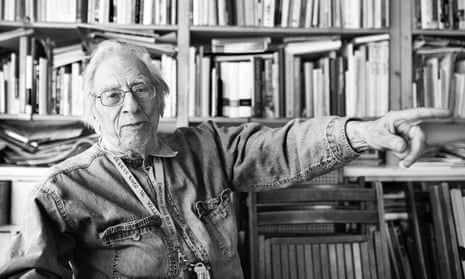Izzy Young, who has died aged 90, was a key figure in the New York folk scene in the heady days of the 1950s and 60s, when he helped to launch the careers of several major musicians, including Bob Dylan. Young became celebrated not as a performer but as an enthusiast, activist, writer and entrepreneur, always more eager to promote the music he loved than to make a profit. His shop Folklore Center in MacDougal Street, Greenwich Village, opened in 1957 and became a haven for fans and artists, who would stop here to meet, perform, or search for records, books and sheet music.
Inevitably, Dylan dropped in soon after he moved from Minnesota to New York in 1961, and the most vivid description of Young’s massively influential little empire can be found in Dylan’s 2004 memoir, Chronicles Volume One. Dylan calls the place “the citadel of Americana folk music … It was like an ancient chapel, like a shoebox sized institute. The Folklore Center sold and reported on everything that had to do with folk music”.
As for Young himself, Dylan noted that he “was an old-line folk enthusiast, very sardonic and wore heavy horn-rimmed glasses, spoke in a thick Brooklyn accent, wore wool slacks, skinny belt and work boots, tie at a careless slant. His voice was like a bulldozer and always seemed too loud for the little room … To him, folk music glittered like a mound of gold.”
Young kept diaries about events in the folk community, and these included his observations on Dylan, whom he quizzed about his early life and interest in folk music. He would pull out records for Dylan to listen to, and introduced him to other musicians, including Dave Van Ronk. Other visitors to the shop included Pete Seeger, Allen Ginsberg, and that stalwart of the Greenwich Village music scene, Happy Traum.
Traum told me: “We used the store as our home base, clubhouse, gossip mill and resource for books, magazines, strings, picks, capos and other paraphernalia of our folksinger’s trade.” He described Young as “a kind of big brother – some would say father figure – who presided over his little domain like an autocrat of a small country. He could be opinionated, irritable, kind, generous, judgmental, funny and good-natured all in one short time period. We loved him.” For Peggy Seeger, another artist who was helped by Young, he was “off-the-wall, full of talk, welcoming to everyone”.
Born in New York, Israel Young was the son of Philip and Pola, Jewish immigrants who had moved to the US from Łódź, in Poland. Izzy’s father ran a Brooklyn bakery, while his mother worked in Chinese restaurants to help the family finances. Izzy attended high school in the Bronx and later studied at Brooklyn College. While a student he became fascinated by folk dance and folk music, joining the American Square Dance Group. After working for his father’s bakery he became a dealer in folk music books, and then opened the Folklore Center.
As a promoter, Young staged shows across New York, including events at his own shop, where Traum remembers seeing “the New Lost City Ramblers, the Clancy Brothers and Odetta, among others, in Izzy’s very small store”.
In 1957 he promoted a concert at the Actors Playhouse for the young Peggy Seeger, who remembers that “it was completely solo, and I had no contemporary songs, just folk songs – he gave me that opportunity”. Four years later he put on Dylan’s first major concert, at Carnegie Chapter Hall, in November 1961, a few months after Dylan had arrived in the city.
Earlier that year, he was involved in what became known as the “folk riot”, after the New York city parks department banned folk musicians from Washington Square Park, a long-established meeting place in Greenwich Village. Hundreds of musicians took part in the protest, and Traum noted that Young sang The Star Spangled Banner, This Land Is Your Land “and other patriotic songs in his decidedly unmusical voice”. The city eventually relented and folk singing was restored.
Young also helped to establish one of New York’s most celebrated folk clubs. In 1960 he persuaded Mike Porco, a friend who owned a bar and restaurant called Gerde’s, to put in a stage and sound equipment and host folk shows. But due to a lack of business acumen, Young lost control of the venue within a few months, and it was taken over by others. As Gerde’s Folk City, it became one of the most successful venues in New York.
His other folk-related ventures included writing for the magazine Sing Out! for 15 years, and hosting a regular music show on the New York radio station WBAI. He was successful at everything – except making money. Ben Paley, the son of the musician Tom Paley, remembers his father calling Young “a lovely man with a terrible head for business. He was so bad that he would sell something for less than he paid for it.”
In 1973, Young moved to Stockholm, with his French partner, Catherine Grandin. There he started the Folklore Centrum, modelled on his original New York base, but with performances by Swedish and international musicians, including Tom and Ben Paley. Ben noted that Young “spoke immaculate Swedish – but with a Bronx accent”.
In 1989 Young returned to Greenwich Village to film the documentary Talking Folklore Center, named after an unrecorded early Dylan song about the MacDougal Street store. Young’s archives of the New York folk scene, including his diaries, now form a collection in the Library of Congress.
He is survived by Catherine, their daughter Philomène, by a son, Thilo Egenberger, from another relationship, and three grandchildren.

Comments (…)
Sign in or create your Guardian account to join the discussion